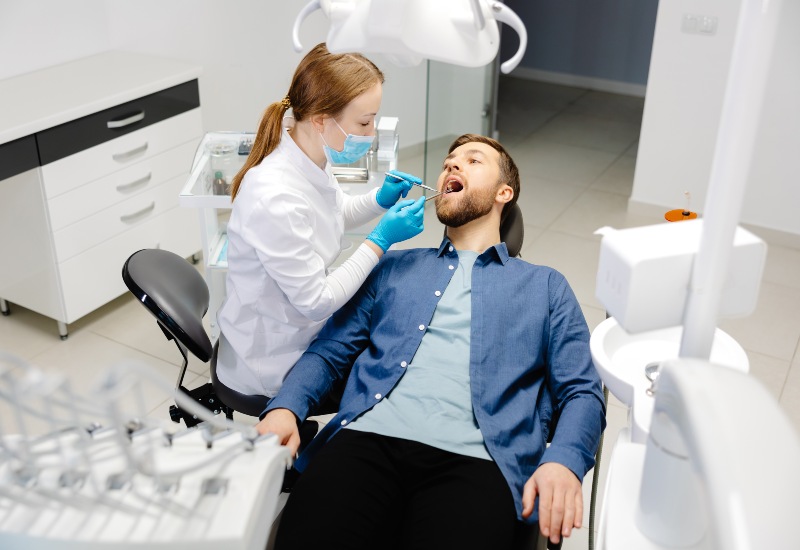Why Regular Dental Checkups Matter
Don’t Wait for Pain: The Importance of Dental Checkups
In Antioch, IL, regular dental visits are much more than cleaning your teeth. They’re your first line of defense against serious oral health issues. Most people schedule dental checkups when they have a problem, such as a toothache, bleeding gums, or a chipped tooth. However, waiting until something hurts can lead to more complex and expensive treatments. During routine dental checkups at Antioch Advanced Dentistry, your dentist can catch problems early, provide professional cleaning, and offer personalized advice to keep your smile healthy for years to come. Below, we’ll help you understand why regular checkups are essential and how to make the most of every visit.

The Role of Regular Dental Checkups
Regular dental checkups serve as comprehensive health evaluations for your mouth. Your dentist will visually inspect your mouth using specialized tools and lighting to check for signs of decay, gum disease, oral cancer, and other conditions. X-rays may be taken to reveal problems not visible to the naked eye, such as bone loss, cavities, or impacted teeth. Professional teeth cleaning is another crucial aspect of routine dental care. Even with excellent home care, plaque and tartar can build up in hard-to-reach areas. Dental hygienists use specialized tools to remove these deposits, which helps prevent cavities and gum disease.
Benefits of Regular Dental Visits
Preventive dentistry offers numerous advantages that save you time, money, and discomfort. Benefits include:
- Early Problem Detection – Catching dental issues early is often the difference between a simple filling and a root canal. During routine examinations, dentists can identify small cavities, early signs of gum disease, and other problems when they’re still easily treatable.
- Professional Cleaning – Cleanings remove plaque and tartar that regular brushing and flossing can’t eliminate. Teeth cleaning benefits include preventing cavities, reducing the risk of gum disease, and leaving your teeth feeling smooth and looking brighter.
- Oral Cancer Screening – Your dentist screens for signs of oral cancer during routine checkups. Early detection dramatically improves treatment outcomes, making this screening an invaluable part of preventive dental care.
- Cost Savings – Preventive care is typically much less expensive than restorative treatments. A routine cleaning and examination costs significantly less than root canals, crowns, or periodontal therapy.

Common Misconceptions About Dental Checkups
Several myths persist about dental checkups that prevent people from seeking regular care. Understanding these facts can help you make informed decisions about your oral health:
- “I Don’t Need Checkups If My Teeth Don’t Hurt” – Pain is often a late symptom of dental problems. By the time you feel discomfort, issues like cavities or gum disease may have progressed significantly. Regular checkups catch problems before they cause pain.
- “Daily Brushing and Flossing Are Enough” – While excellent home care is crucial, it can’t replace professional dental care. Even the most diligent brushing and flossing can’t remove all plaque and tartar, especially in difficult-to-reach areas.
- “Dental Checkups Are Just About Teeth” – Modern dentistry takes a comprehensive approach to oral health. Dentists examine your entire mouth, including gums, tongue, throat, and jaw joints. They also consider how your oral health relates to your overall well-being.
How Often Should You Visit the Dentist?
The standard recommendation for routine dental care is every six months, but individual needs may vary. This timeline works well for most people because it allows dentists to monitor their oral health regularly without being excessive. Your dentist will recommend an appropriate schedule based on your oral health status and risk factors. However, these factors may influence how often you need dental checkups:
- Higher Risk Patients
- Excellent Oral Health
- Age Considerations
- Lifestyle Factors
Signs You Shouldn’t Wait for Your Next Checkup
While routine visits are important, certain symptoms indicate you should schedule an appointment immediately rather than waiting for your next regular checkup. These signs include:
- Persistent Tooth Pain – Ongoing discomfort or sensitivity may indicate underlying issues like cavities, infections, or gum problems that require immediate attention.
- Swelling or Redness – Unusual swelling or redness in the gums, cheeks, or jaw area could indicate infection or inflammation.
- Loose or Shifting Teeth – Any changes in the position or stability of your teeth should be addressed promptly to prevent further complications.
- Sores or Lumps – Unexplained sores, lumps, or rough patches in your mouth that don’t heal within two weeks warrant a dentist’s evaluation.
Tips for Making the Most of Your Dental Visits
Preparing for your dental checkup can help ensure you get the maximum benefit from your visit. Here are a few preventive dental care tips:
- Share Your Medical History – Your dentist can provide better care if you’re transparent about your medical history and any medications you’re currently taking. Informing your dentist allows for more personalized treatment.
- Stick to Regular Appointments – Consistency is key when it comes to dental health. Scheduling regular check-ups helps maintain your oral hygiene and allows your dentist to detect and treat potential issues before they become more serious.
- Follow Aftercare Advice – If your dentist provides aftercare instructions, whether it’s following a procedure or general guidance for better oral care, make sure to follow them closely. Proper aftercare can speed healing, prevent complications, and enhance treatment longevity.
Schedule Your Next Appointment Today
Regular dental checkups can prevent serious oral health problems. By prioritizing routine dental care, you’re taking a proactive approach that can save you from complex treatments and significant expenses in the future. Don’t wait until you have a problem to schedule your next appointment. Contact us today to establish a routine that works for your lifestyle and oral health needs.
Frequently Asked Questions
What happens if I haven’t been to the dentist in years?
Don’t let embarrassment keep you from getting the care you deserve. Dentists understand that people sometimes avoid care and are focused on helping you achieve good oral health moving forward.
How long do checkups typically take?
Most routine checkups, including cleaning and examination, take 45 minutes to an hour. The time may vary depending on your individual needs and the complexity of any issues discovered.
Will insurance cover routine checkups?
Most dental insurance plans cover routine checkups and cleanings. Check with your insurance provider for specific coverage details.
